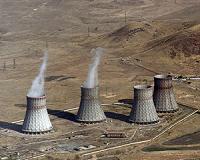 |
Washington (AFP) March 14, 2011 The meltdown and radiation fears at Japan's nuclear power plants following a massive earthquake put nuclear power supporters on the defensive Monday just as the industry was enjoying a renaissance. Opponents raised new doubts about the safety of nuclear plants advertised as "clean" energy, and investors dumped the shares of companies that manufacture or operate nuclear plants. Supporters of the industry, which has more than 200 reactors under construction or planned around the world, were meanwhile backpedaling, calling for safety reviews and distancing their own situations from Japan's. "The severe nuclear incident in Japan has put a global nuclear renaissance into question," said Alex Barnett, an industry analyst at Jefferies International. "This incident is sure to cast fresh doubt in the public's eyes on the safety of nuclear power and will likely to have a lasting impact on the industry." In the United States -- the world's biggest producer of nuclear energy, depending on 104 reactors to supply 20 percent of all electricity -- some politicians stepped back from President Barack Obama's $18.5 billion push to expand the sector. "I've been a big supporter of nuclear power because it's domestic -- it's ours and it's clean," Senator Joseph Lieberman said Sunday. Nevertheless, he said, "I think we've got to... quietly and quickly put the brakes on until we can absorb what has happened in Japan." The White House stood by its policy, but with a note of caution. "Information is still coming in about the events unfolding in Japan, but the administration is committed to learning from them and ensuring that nuclear energy is produced safely and responsibly here in the US," White House spokesman Clark Stevens told The New York Times Sunday. In Europe, Japan's troubles reignited old battles, especially in Italy which was moving to revive nuclear power after having rejected it by referendum in 1987, one year after the Chernobyl disaster. German Chancellor Angela Merkel announced the reconsideration of a recent plan to keep Germany's 17 reactors on line to the 2030s, well beyond what had originally been slated. "We cannot just go back to business as usual," she said. "Events in Japan... teach us that risks that were thought to be completely impossible cannot in fact be completely ruled out," Merkel said. Austria called for "stress tests" to be conducted on all European nuclear power stations, including for earthquakes. "We want security to be reviewed or (plant) closure," Environment Minister Nikolaus Berlakovich said. While environmentalists in France renewed their call against nuclear energy, the government was cautious and even the opposition Socialist Party said they would just like to reduce nuclear's 80 percent share of all of the country's electricity generation. But French ministers held an emergency meeting on Sunday with energy companies and nuclear safety experts to discuss the Japanese crisis. "It is not yet a catastrophe," the industry and energy minister, Eric Besson, said, but added: "We absolutely cannot rule that out." And in London Energy Minister Chris Huhne stressed the difference between Britain and Japan, while saying lessons can be learned from Japan's experience. Britain's government cleared the way in October for new nuclear power plants to be built at eight sites in England and Wales. The British are "frankly, amazingly lucky that we don't live in a seismically active earthquake zone like Japan," he told BBC television. At the same time, "I'm asking our own nuclear regulator, or safety authorities, to look very carefully at the Japanese experience to learn any lessons that we can, both for our own existing nuclear reactions and for any new nuclear program." In China, which has the world's largest nuclear building program, with 13 reactors in place and 34 greenlighted, officials were unfazed. "We can learn lessons from Japan in the development of nuclear power in China," Zhang Lijun, vice minister of environmental protection, said Saturday. Still, "the plan and determination for developing nuclear power in China will not change." But in China's similarly energy-hungry rival India, Prime Minister Manmohan Singh ordered immediate safety checks on the country's 20 nuclear power plants to "ensure that they would be able to withstand large natural disasters such as tsunamis and earthquakes." Even while they appeared focused on safety, politicians in a number of countries seemed worried that Japan's plight would turn public opinion against nuclear plants. "Public opinion obviously is going to be very influenced by the investigation. And the investigation is absolutely crucial," said Britain's Huhne. "Nuclear plants are robust, but their continued operation and especially the expanded use of the technology depends more on the public's belief that they are safe," Barclays Capital analysts said in a client note.
Share This Article With Planet Earth
Related Links Nuclear Power News - Nuclear Science, Nuclear Technology Powering The World in the 21st Century at Energy-Daily.com
 Nuclear contamination: The options
Nuclear contamination: The optionsParis (AFP) March 13, 2011 Evacuation, temporary shelter and iodine pills are the chief weapons for protecting civilians against nuclear fallout, experts say. A blast on Saturday that wrecked the concrete shell surrounding the No. 1 reactor at Japan's Fukushima nuclear plant released radioactive vapour but not at levels dangerous for human health, according to Japanese officials. Specialists say the authorities ha ... read more |
|
| The content herein, unless otherwise known to be public domain, are Copyright 1995-2010 - SpaceDaily. AFP and UPI Wire Stories are copyright Agence France-Presse and United Press International. ESA Portal Reports are copyright European Space Agency. All NASA sourced material is public domain. Additional copyrights may apply in whole or part to other bona fide parties. Advertising does not imply endorsement,agreement or approval of any opinions, statements or information provided by SpaceDaily on any Web page published or hosted by SpaceDaily. Privacy Statement |